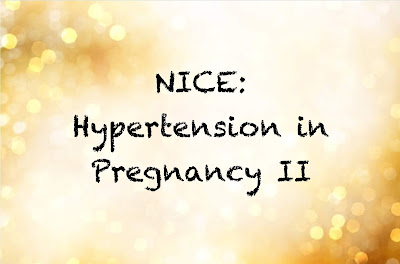This blogpost is Part #2 of summary of latest NICE guideline “NG 133: Hypertension in pregnancy: diagnosis and management released in June 2019. As this is a long guideline, so I planned to cover the topic in 2 posts.
This Post covers Fetal Monitoring, Intrapartum Care, Management in Critical Care, Post delivery, Drugs, Follow up and Next Pregnancy advice. This guideline has significant changes in recommendations. I have tried my best to extract all the important points.
You must go through the original guideline, which can be downloaded here: NG133
Let me know in comments if there are more points to be added.
Thanks
Hypertension in pregnancy: diagnosis and management
Fetal Monitoring
Chronic HTN
- Carry out USG for fetal growth & amniotic fluid volume assessment plus umbilical artery doppler at 28, 32 and 36 wks
- CTG → only if clinically indicated
Gestational HTN
- Carry out USG for fetal growth & amniotic fluid assessment plus umbilical artery doppler at diagnosis
- If normal → repeat if clinically indicated
- CTG → only of clinically indicated
Pre-eclampsia or severe gestational HTN
- CTG→ at diagnosis
- If conservative management, do ALL at diagnosis
- USG for fetal growth/amniotic fluid assessment
- Umbilical artery doppler
- If normal results→ do not routinely repeat CTG unless clinically indicated
- Repeat CTG → women reports change in fetal movements ; vaginal bleeding; abdominal pain; deterioration in maternal condition
- Repeat USG for fetal growth/amniotic fluid assessment or umblical artery Doppler velocimetry every 2 weeks (subsequent monitoring depend on these scans)
- Write a care plan including ALL
Women who need additional monitoring
- USG for fetal growth/amniotic fluid assessment plus umbilical artery doppler velocimetry starting at b/w 28 - 30wks (or at least 2wks before previous gestation of onset if earlier than 28 wks)
- Repeat 4 weeks later in women with previous
- Severe PET
- PET resulting in birth before 34 wks
- PET with a baby birth weight <10th centile
- Intrauterine death
- Placental abruption
- CTG → if clinically indicated
Intrapartum Care : Follow NICE guideline on Intrapartum care
Blood pressure
- During labour → check BP
- HTN → one hourly
- Severe HTN → every 15-30 min until <160/110 mmHg
- Continue antenatal anti-htn t/m during labour
Haematological and biochemical monitoring
- Same criteria as antenatal to determine the need for test during labour
Care during epidural analgesia
- Severe PET→ Do not preload with I/V fluid
Management of second stage of labour
- Controlled HTN → Do not routinely limit the duration
- HTN not responded to initial t/m→ Consider operative or assisted birth
Medical management of severe hypertension, severe pre-eclampsia or eclampsia in a Critical Care Setting
Anticonvulsants
- Severe HTN/ PET or previously had eclamptic fit→ Give I/V magnesium sulfate
- Severe PET→ Consider I/V magnesium sulfate if birth planned within 24 hrs
- Consider need for MGSO4 of ≥1 feature of severe PET
- Ongoing or recurring severe headache
- Visual scotomata
- Nausea or vomiting
- Epigastric pain
- Oliguria & severe HTN
- Progressive deterioration in lab blood tests
- Magnesium Sulfate
- Loading dose 4 g I/V over 5-15 min → infusion of 1 g/hr maintained for 24 hrs
- If fit→ continue infusion 24hrs after last fit
- Do not use diazepam, phenytoin or other anticonvulsants as an alternatives
Antihypertensive
- Severe HTN + critical care during pregnancy or after birth give one of
- labetalol (oral/I.V) , nefidipine (oral), hydralazine (I.V)
- Severe HTN + critical care → monitor response to t/m
- to ensure BP falls
- to identify adverse effects for mother/baby
- to modify t/m
- First dose of I.V hydralazine (antenatally)→ Consider using up to 500 ml crystalloid fluid before/same time
Corticosteroids
- For fetal lung maturation → If early birth likely within 7 days with PET
- For HELLP t/m→ do not use
Fluid balance and volume expansion
- Do not use in severe PET unless hydralazine used
- Severe PET→ limit fluid to 80 ml/hr unless other ongoing fluid losses
Clinical Criteria for choice of critical care level
|
|
Level 3
|
Severe pre-eclampsia and needing ventilation
|
Level 2
|
Step down from level 3
Severe PET with ANY : eclampsia, HELLP, Haemorrhage, Hyperkalaemia, Severe oliguria, Coagulation support, I/V anti-htn t/m, Initial stabilization of severe HTN, Cardiac failure evidence, Abnormal neurology
|
Level 1
|
Pre-eclampsia with hypertension
Ongoing conservative antenatal management of severe preterm HTN
Step-down t/m after birth
|
Antihypertensive treatment during the postnatal period, including during breastfeeding
- HTN + wish to breast feed
- Advise: t/m can be adapted / anti-htn drugs do not prevent them from breastfeeding
- Explain: anti-htn meds can pass into breast milk
- Most drugs very low levels in breast milk; unlikely to harm the baby
- Make decisions on treatment with women preference
- Consider monitoring BP of babies→ especially who are born preterm or have symptoms of low BP
- While discharging women home → advice to monitor babies for drowsiness, lethargy, pallor, cold peripheries or poor feeding
- Offer → Enalapril during postnatal time with appropriate monitoring of RFT & maternal serum potassium
- Black African or Caribbean family origin with HTN in postnatal
- Consider t/m with nefidipine or
- Amlodipine if woman used it successfully before to control BP
- If BP not controlled with one medicine→ consider combination of nefidipine (or amlodipine) and enalapril
- If not tolerated or ineffective consider either
- Adding atenolol or labetalol to combination treatment or
- Swapping 1 medicine for atenolol or labetolol
- Use medicines which are taken once daily when possible in postnatal period
- If possible→ avoid using diuretics or ARBs in breastfeeding/ expressing milk
- If not breastfeeding→ treat in line with national guidance on “hypertension in adults”
Advice and follow-up at transfer to community care
Risk of recurrence of hypertensive disorders of pregnancy
Overall risk of recurrence → 1 in 5 (20%)
Likelihood of recurrence of hypertensive disorders of pregnancy
|
|||
Prevalence of hypertensive disorder in a future pregnancy
|
Any HTN in pregnancy
|
Pre-eclampsia
|
Gestational HTN
|
Any HTN
|
21% (1 in 5)
|
20% (1 in 5)
|
22% (1 in5)
|
Pre-eclampsia
|
14% (1 in 7)
|
16% (1 in 6)
If birth
at 28-34wks:33% (1:3)
at 34-37 wks: 23% (1:4)
|
7% (1 in 14)
|
Gestational HTN
|
9% (1:11)
|
6-12% (1 in 8)
|
11-15% (1 in 7)
|
Chronic Hypertension
|
N/A
|
2% (1 in 50)
|
3% (1 in 34)
|
Long-term risk of cardiovascular disease
Cardiovascular risk in women who have had a hypertensive disorder of pregnancy
|
||||
Risk of future cardiovascular disease
|
Any HTN in Pregnancy
|
Pre-eclampsia
|
Getstational HTN
|
Chronic HTN
|
Major adverse cardiovascular event
|
↑ up to 2 X
|
↑ up to 1.5-3 X
|
↑ up to 1.5-3 X
|
↑ up to 1.7 X
|
Cardiovascular mortality
|
↑ up to 2X
|
↑ up to 2X
|
No data
|
No data
|
Stroke
|
↑ up to 1.5 X
|
↑ up to 2-3 X
|
May be ↑
|
↑ up to 1.8 X
|
Hypertension
|
↑ up to 2-4 X
|
↑ up to 2-5 x
|
↑ up to 2-4 X
|
N/A
|
- Advised → discuss how to reduce the risk of cardiovascular disease with GP/Specialist
- Avoid smoking
- Maintain healthy weight/ lifestyle
- Women with PET or HTN leading to early birth → pre-pregnancy counseling to discuss risks & possible recurrences
- Keep BMI within healthy range
- Likelihood of recurrence increases with pregnancy interval >10 yrs
- H/o PET with no proteinuria→ tell at postnatal review→ relative risk of end-stage kidney disease is increased but absolute risk is low & no further followup needed
- Do not routinely perform thrombophillia screening in women who had PET
Useful Links


Thank you so much!This really helped. I first read the whole guideline and your post made me revise and restore everything.
ReplyDeleteThank Anum for appreciation. I am glad my post was helpful for you.
DeleteExcellent informatioN! Really nice blog! Thanks for sharing with us! Keep it up! Keep sharing! IVF Treatment is the best solution for the people who are coping with the infertility issues. cost of ivf treatment in india
ReplyDeleteSuch an amazing blog! This is very useful information and thanks for sharing it with us.Consult Dr. Neera Gupta, She is the best doctor in Gem Hospital and IVF Centre . Contact no: 9872344833
ReplyDeleteThanks for picking out the time to discuss this, I feel great about it and love studying more on this topic. It is extremely helpful for me. Thanks for such a valuable help again. حوامل
ReplyDeleteIt is imperative that we read blog post very carefully. I am already done it and find that this post is really amazing.
ReplyDeletebirth
Wow i can say that this is another great article as expected of this blog.Bookmarked this site.. حاسبة الحمل
ReplyDeleteحوامل This is such a great resource that you are providing and you give it away for free. I love seeing blog that understand the value of providing a quality resource for free.
ReplyDeleteWe are really grateful for your blog post. You will find a lot of approaches after visiting your post. I was exactly searching for. Thanks for such post and please keep it up. Great work. pregnancy tests
ReplyDeleteGrace Medical Clinic is a full-service health care clinic who work together to serve all your medical needs in all stages of life. Each Grace Medical Clinic provider takes a hands-on approach to looking after their patients throughout all phases of their healthcare services. We provide the latest healthcare facilities for individuals and families. We strive to offer the best advice and treatments to keep your family as healthy and safe as possible. We currently provide acute care, chronic medical conditions, hypertension, cholesterol, thyroid, TB screening, upper respiratory infection, STD testing and more. We focus on providing a professional and patient friendly environment.
ReplyDelete